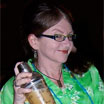

Anton LaVey Looks at Astrology, Psychology and Greater Magic
by Magistra Peggy Nadramia
In June of 1968, Professor Lee Sechrest of the Department of Psychology at Northwestern University wrote to Anton LaVey, seeking his perspective on a paper about astrology. Marcello Truzzi, who at that time was teaching at the University of South Florida, had put Sechrest in touch with LaVey, thinking he’d be interested in the general subject matter of the paper, “Astrologers As Marriage Counselors.” The paper explores astrologers as one of several types of alternate “healers,” that is, “poor men’s psychologists” who offer an inexpensive or free, accessible alternative to actual therapy: “It is evident that there are many persons who seek advice from other than professional sources, and it behooves us to know as much as we can about the practices of what we have come to call quasi-therapists.”
LaVey responded promptly and with interest. “I am,” he said, “perhaps, one of the few actively involved in the occult who does not put much stock in astrology. I feel that it is only another form of arbitrary divination, and is wholly dependent upon the ‘mediumistic’ abilities of the astrologer.”
He continues. “Astrology has become a religion to many, as it is a dogma but has much room for individual interpretation. I feel that any validity in astrology must be chalked up to auto-suggestibility on the part of the followers. Since astrology is becoming increasingly fashionable, practically everyone has read or heard something about it, and is influenced by the supposed characteristics of their sign. Therefore, one must not rule out astrology as a part of character analysis — not because the stars have anything to do with the formation of the personality, but because people know how they are supposed to act, and therefore, act accordingly.”
My personal observation over a lifetime has been that people will consult a therapist for the sort of attention and listening ear that friends might commonly provide. I was intrigued to see that this concept was a secondary theme for the study. Citing an earlier paper by W. A. Schofield, the authors suggest that some view “…the entire psychotherapeutic enterprise as a device whereby a distressed and alone individual may purchase friendship.”
LaVey concurs: “After quite a number of years in the field of personal consultation, I have found your theory of people’s willingness to buy friendship (or attention) to be completely true. It is very sad but true; people would rather hear ego-boosting lies about themselves and not be helped, than listen to sound advice which might lead to success (and additional responsibility!).”
I wouldn’t have expected LaVey in later years to respond to such a solicitation of his thoughts on astrology or people’s psychological need for this and other forms of dime store guidance. He would have considered those questions answered in his body of work. But in 1968, he was still writing The Satanic Bible and formulating his philosophy with the firm conviction that it had liberating and therapeutic benefits for its adherents. “I believe that Satanism has found the answer to this perplexing situation, as it allows people to play-act and ‘kid’ themselves temporarily, and thereby, eliminate the need to pretend to be something they’re not in their everyday lives. By using the ritual chamber to act out roles they would like to be (or roles they would like others to identify them with) they are far more content with their sometimes monotonous, drab daily lives.”
LaVey had no problem, therefore, with people doing whatever they needed or wanted to do (within legal parameters and with the consent of others) to make themselves feel better. That could be reading your daily horoscope, consulting a fancy psychotherapist, talking to your bartender, or conducting a ritual with heavy use of theatrics and psychodrama. His only stipulation? Don’t lie to yourself about what you’re really doing and why you’re doing it. “Satanism’s only ‘deadly sin’ (if there is such a thing),” he concludes in the letter, “is self-deceit.”


Portrait
We Are Legion
A Moment In Time
This slideshow requires JavaScript.
SUPPORT THE
CHURCH OF SATAN!
There are many ways you can support the Church of Satan. Visit our support page to learn how.
navigation-topper



